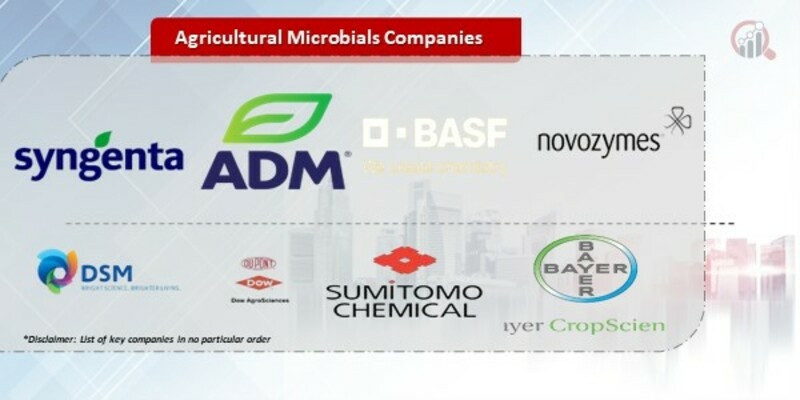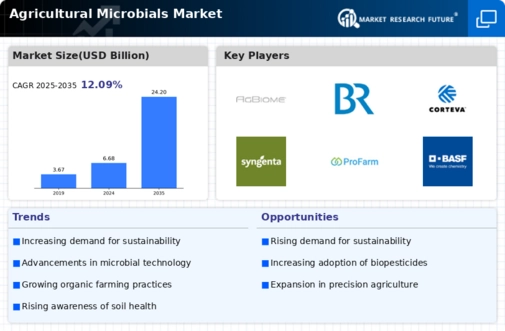Top Industry Leaders in the Agricultural Microbials Market
 Agricultural Microbials Market
Agricultural Microbials Market
The Agricultural Microbials Market has witnessed remarkable growth owing to the increasing demand for sustainable farming practices, reducing chemical usage, and enhancing crop yield. The competitive landscape of this market is vibrant and dynamic, driven by a diverse array of key players and emerging companies vying for market share.
Key players such as
- Syngenta AG (Switzerland)
- BASF SE (Germany)
- Novozymes A/S (Denmark)
- Dow AgroSciences LLC (U.S.)
- Sumitomo Chemical Company Ltd. (Japan)
- Nufarm Ltd. (Australia)
- Bayer CropScience AG (Germany)
- Koppert B.V. (Netherlands)
- Certis U.S.A. LLC (U.S.)
Strategies Adopted
Strategies adopted by these key players revolve around product innovation, technological advancements, and geographical expansion. They invest significantly in research and development to introduce novel microbial products that offer higher efficiency, improved crop protection, and sustainable solutions. Furthermore, strategic alliances with local distributors and agricultural cooperatives help penetrate regional markets effectively.
Market Share Analysis
Market share analysis factors encompass product portfolio diversification, market penetration strategies, brand recognition, regulatory compliance, and customer loyalty. Companies that offer a wide range of microbial products catering to different agricultural needs tend to capture a larger market share. Effective marketing strategies, strong distribution networks, and adherence to stringent regulatory standards also play pivotal roles in determining market share.
Emerging Companies
Amidst these established players, new and emerging companies are making significant strides in the agricultural microbials market. Start-ups and smaller firms are focusing on niche segments, specializing in unique microbial formulations targeting specific crop diseases or enhancing soil health. These companies emphasize agility, innovation, and agility in their operations, often disrupting the market with groundbreaking solutions.
Industry news highlights ongoing advancements, regulatory changes, and innovations shaping the agricultural microbials landscape. Recent developments include the introduction of biopesticides, biofertilizers, and biostimulants with enhanced efficacy and environmental safety. Additionally, collaborations between agricultural technology companies and biotech firms to develop cutting-edge microbial solutions have garnered attention. Moreover, increased adoption of precision agriculture and digital technologies to optimize microbial application has been a notable trend.
Current company investment trends reflect a growing focus on sustainable agriculture and environmental conservation. Investments are pouring into research and development initiatives aimed at discovering novel microbial strains, improving formulation techniques, and exploring new application methods. Venture capital funding for start-ups specializing in agri-biotech and microbial solutions has increased significantly, indicating investor confidence in this burgeoning sector.
Overall, the competitive scenario in the agricultural microbials market remains intense and evolving. Key players continue to innovate and expand their product portfolios through strategic partnerships and acquisitions, while new entrants disrupt the market with specialized solutions. The industry's future will likely witness further advancements in microbial technology, increased adoption of sustainable farming practices, and a shift towards eco-friendly agricultural inputs, ensuring a competitive yet environmentally conscious landscape.
Recent News :Top of Form
Novozymes dominate the market, leveraging their extensive R&D capabilities, global presence, and robust product portfolios. These industry giants focus on strategic collaborations, mergers, and acquisitions to strengthen their market position and expand their product offerings. Collaborations with research institutes and agricultural organizations enable them to develop innovative microbial solutions tailored to meet specific crop requirements.










